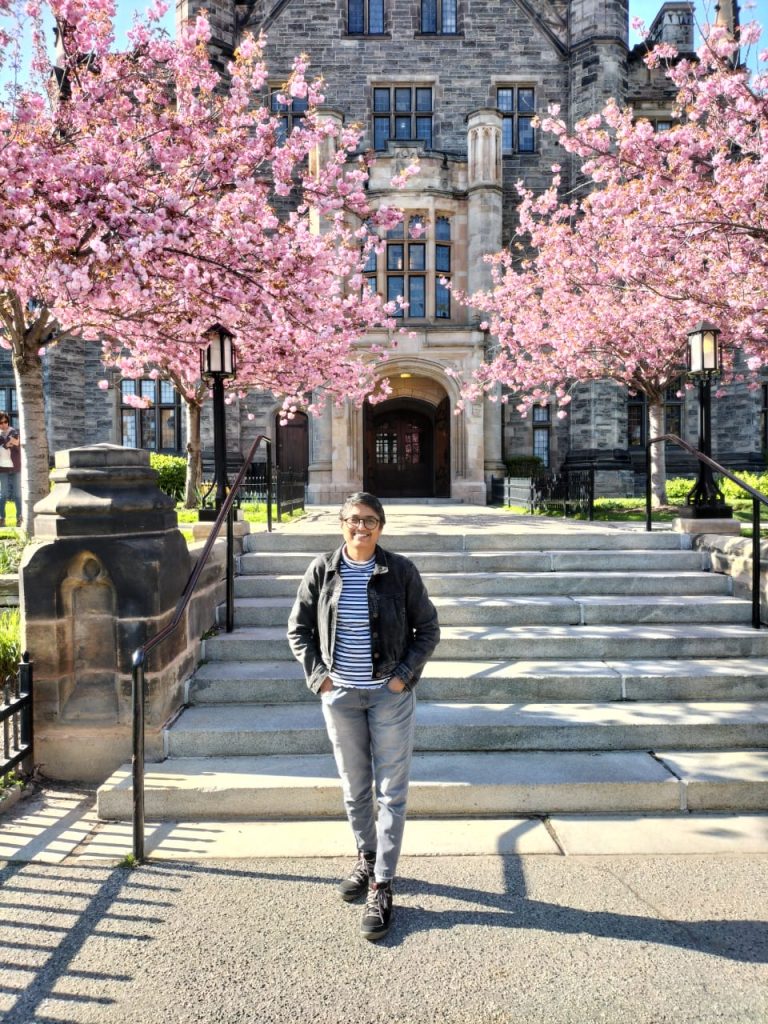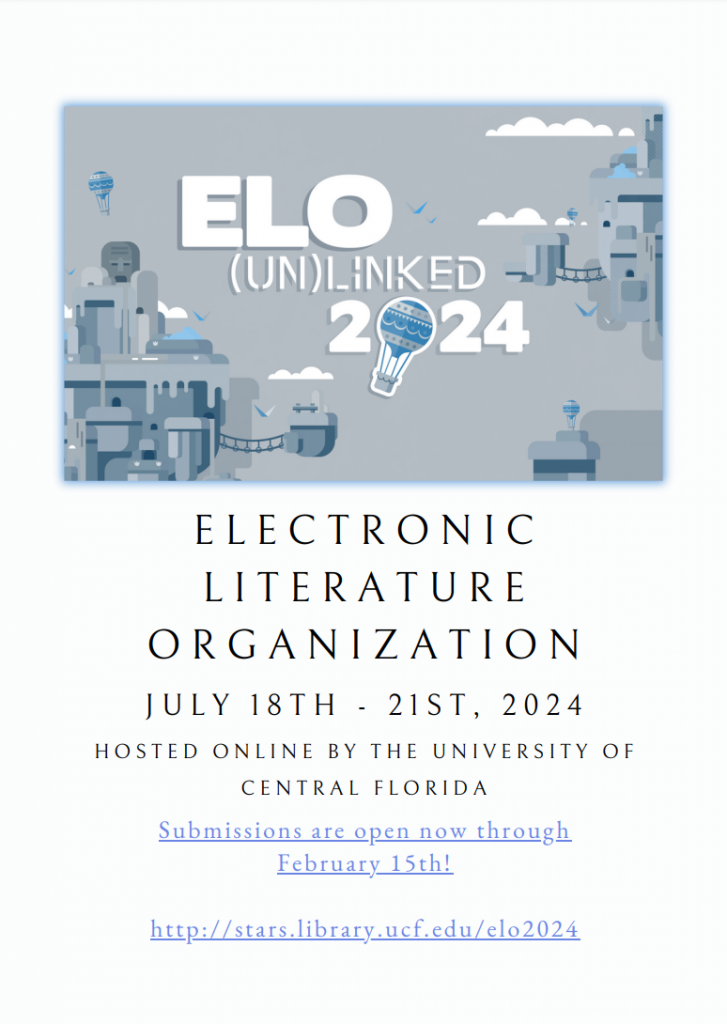ELO is excited to announce the winners of the 2025 Electronic Literature Awards. These awards were coordinated by. Alinta Krauth and Jason Nelson. ELO gives 4 juried awards that come with a cash prize and the esteem of the international e-lit community.
The Marjorie C. Luesebrink Career Achievement Award
Judges: Stephanie Strickland, Lai-Tze Fan, Maria Engberg
Winner: Bertrand Gervais
Bertrand Gervais is a Professor in the Literary Studies Department at the University of Québec in Montréal (UQAM). He is the Director of Figura, the Research Center on Textuality and the Imaginary, and of NT2, the Research Laboratory on Hypermedia Art and Literature. From 2015 to 2024 he served as the Canada Research Chair in Digital Arts and Literatures. During his career he participated in and supported The CELL Project for the Electronic Literature Organization. He also organized a brilliant ELO conference in Montreal.
Bertrand’s career, spanning more than 40 years of contributions to scholarship in digital artforms, has been foundational in the field of digital literary arts, semiotics of the web, and digital aesthetics. As cofounder of the NT2 laboratory, Bertrand not only established key research and documentation methodologies but cemented the bridge between Francophone research in the field and world-wide initiatives. Under his direction, the partnership Littérature Québécoise Mobile revolutionized the Web presence of the literary community of Francophone Canada for the benefit of creators and the linguistic minority publishing industry.
Bertand’s contributions and efforts toward international, interuniversity, and interdisciplinary collaboration have proved essential for several generations of researchers, artists, and digital creators. As co-founder of the 1P1 Laboratory, which specializes in extended realities, Bertrand’s work continues to have an impact on current and future research, revolutionizing the spheres of scientific engagement with the arts, technologies, and research-design.
___________________________________________
The N. Katherine Hayles Award for Criticism of Electronic Literature
Judges: Dene Grigar, Mariusz Pisarski, Monique Tschofen
Winner:
The Culture of Neural Networks: Synthetic Literature and Art in (not only) the Czech and Slovak Context, by Karel Piorecký and Zuzana Husárová
A fascinating and timely perspective on art, neural networks, and AI, offered by scholars from regions where the ideas of the Golem, the robot, and alchemical enhancement of the human spirit have long been created, practiced, and discussed—even around family dinner tables. This Czech and Slovak lineage lends the work a unique historical and philosophical angle. Piorecký and Husárová temper the current wave of enthusiasm and uncritical faith in AI in a productive manner, offering a balanced view on creativity and AI. The body of knowledge and artistic practice that serves as context breathes fresh air into the global conversation on synthetic creativity. By highlighting voices and examples from continental and Central European art and science, the authors enrich the field of electronic literature, introducing underexplored contexts, names, and traditions that should benefit researchers and creators worldwide.
Runner Up
The New Legibility, by Theo Ellin Ballew
Beautifully designed, this highly witty, playful and meta-referential essay manages to both show and tell; an example of how interactive forms of scholarship can do things that printed pages cannot. With an interface that effectively uses hypertextual links, crossouts, and bubbles, Ballew deeply theorizes what legibility means in the context of the history of elite, disability, design, and the materiality of reading. This playful and insightful academic essay on the nature of text on the screen pays homage to the vernacular web of old and cult classics such as Grammatron. The meta-commentary is ironic and provocative, defining and enacting “static” text as “less legible,” while rendering mobile text as an expression of stability. As readers digest these turns of phrase and meaning, the text invites them to doodle on the screen, leaving their own mark on the background of micro-lexias before proceeding to the next chunk of argumentation. User-friendly, with a backlink mechanism for visited lexias and a reset button, this small hypertext evokes alternative expressions of academic discourse.
Honorable Mention
Lillian-Yvonne Bertram and Nick Montfort’s Output: Anthology of Computer-Generated Text, 1953-2023
Lillian-Yvonne Bertram and Nick Montfort’s Output: Anthology of Computer-Generated Text, 1953-2023 is an excellent resource and a milestone of scholarly research. Organized into 17 thematic sections, from conversations to literary forms to Tweets, along with detailed back matter (e.g., glossary, timeline), the book covers much ground necessary for understanding 200 different explorations with English-language “outputs” over the last 70 years. It is a monumental reference for students and scholars alike.
The Robert Coover Award for a Work of Electronic Literature
Judges: Kwabena Opoku-Agyemang, Florence Walker, Lyle Skains
WINNER: Espejo de Carne, by benjamin escalonilla godayol
The judges found Espejo de Carne delightfully visceral and weird, full of flavour and thoughtfulness. The narrative resonates intensely, and the music is used in a multiplicative effect to both heighten the text and encourage the reader to linger on particular passages. On its own, the text is compelling, well-written, a science-fiction-oriented dive into the reader/player’s “birth” as a cloned human, experiencing the rawness and newness of life, the universe, and everything. The presentation is curated, technically flawless, easing the reader/player into the interactivity even as they become engrossed in this story of themselves as duplicate, guided by interactions with their OG human. Techies may find the “electronic” in this work of electronic literature slow to develop, but we found the confluence of a strong narrative, an original voice, the seeding and layering of multiple modes and carefully considered interactivity to work beautifully to convey a story that manages to put the reader/player deeply, immersively into a character’s life without resorting to overt gameplay or gimmicks. Espejo de Carne‘s subtle use of choice, linkage, and multimedia place the reader/player firmly within an interesting and enjoyable interactive narrative.
RUNNER UP:
Happenings: A tragic-lyrical philosophical essay, by Monique Tschofen
This work is well-conceived, brilliantly executed, and quietly devastating, leaving the judges with a tangible heaviness, a precision-targeted burst of emotion. In a world that is all-too-often dismissive of sexual assault, Happenings constitutes a thoughtful and striking intervention. The judges were especially impressed by its commitment to keeping the reader/player uneasy – an impulse that never tipped over into gratuitous misery. Artistically, the work uses LLMs well, though such tools bring with them their own implications within a work positioned as a feminist text. The use of Scalar for creative purposes is also to be commended, as the platform has primarily been deployed for pathways through scholarship; in this context it is an extremely apt foundation for a philosophical essay. Overall, the work is well-constructed and artfully conveyed.
Honourable Mention
BabyHex, by David Ciccoricco, Mez Breeze, and Marine Cone
BabyHex plays with the creative anthropomorphisation of gen-AI/LLMs using gen-AI, while simultaneously playing with the reader through the illusion of agency. The interface is polished and effective, conveying the contrary and possibly cursed nature of these interactions in a highly meaningful way.
Honourable Mention
Hunting and Gathering in Cyberspace, by Judy Malloy
The lyrical nature of “narrabase” fiction is on full display in this work, scrambling together the short lyrical pieces of text into an ever-shifting poetic narrative. There is also a nostalgic effect, a clunky inconvenience to the hyperlinked elements that reflects the experience of the nascent World Wide Web of the time. A work worth exploring, then and now.
The Maverick Award
Judge: Rob Wittig and Christine Wilks
Winner: Jason Nelson
Jason Nelson is a prolific, bright, mischievous, and thought-provoking creator. The contact button on many of his interactive online works reveals two statements that capture the spirit of his decades of work.
“I make odd games / artworks / digital poems
You hate / love / are confused by what I make”
The confusion Jason’s work sparks is a generous, friendly confusion, hilarious and serious at the same time. Throughout decades of award winning work — work appearing on screens, in quirky physical objects, and stunning visuals projected onto huge architectural spaces — Jason has accurately assessed the norms and expectations of current digital culture. Then he has set about systematically breaking those norms and frustrating those expectations. The result is insight. And laughter. Jason’s work always shows you something you hadn’t witnessed before in digital culture, and inside yourself.
One of Jason’s superpowers is actually to see interfaces and platforms. These frameworks, once introduced, quickly become invisible. Their creators often wish them and design them to become invisible in order to hide the degree to which they extract our money and attention. Jason makes mischief with frameworks. His scribbly marks and simplified forms call into question slick, orderly, high-design. His games don’t follow the rules. He makes familiar keystrokes do unfamiliar things, and users rediscover the joy of curious clicking. The topics of the work are important, dealing with how humans relate to themselves, each other, and the earth.
He is a wonderful line-by-line writer. Just to quote a few project titles:
“Birds Still Warm from Flying,”
“Holiday Disaster Generator,”
“alarmingly these are not lovesick zombies,”
and “With Love from a Failed Planet.”
Jason’s upbringing amid the farms and ranches of Oklahoma reminds us of the roots of the term maverick, which in the American west meant an unbranded calf, cow, or steer who wanders away from the herd. Jason Nelson’s innovative wanderings are a great gift, and he richly deserves this award.





